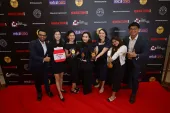
Diversifying supply sources needed to reduce business risk, says RSM partner
David pointed out how companies’ efforts to expand their social commerce space play a significant factor today.
David Eu is a Partner at RSM Chio Lim LLP, where he is responsible for a diverse portfolio of listed and privately owned clients and handles initial public offering (IPO) engagements.
He is responsible for a diverse portfolio of audit clients in the industrial, consumer products, food & beverage and retail industries.
David is a practising member of the Institute of Singapore Chartered Accountants and a member of CPA Australia.
As a judge for the FMCG Asia Awards, he sat down with Retail Asia to discuss how the effects of the pandemic in the industry manifest today, how companies can stay competitive amidst the rapid changes, as well as how to ensure an inclusive and diverse environment.
What do you think are some of the trends observed in the FMCG industry for the past 12 months? Where do you think companies should focus to remain relevant?
As the Covid-19 pandemic disrupted movements and business operations over the past two years, companies in the FMCG industry had to shift towards using e-commerce platforms and introduce improvements in supply chain methods to ensure business continuity. Government grants and schemes have facilitated this shift, allowing businesses to adopt technological tools that can improve functionality and long-term productivity. Another trend is the high turnover of headcount as a result of the increasing demands and pressures of the industry.
To stay relevant, FMCG businesses need to tap into a wide pool of consumers who shop online whilst maintaining traditional marketing strategies for physical stores. Coupled with this is a need to explore alternate modes of logistics and transportation carriers rather than relying solely on company-sourced vehicles that deliver products at fixed time slots. Consumer demand often sees spikes and falls throughout the year based on B2C trends, which businesses need to be prepared for. After all, the future lies with those who embrace new technological innovations.
With your vast experience, what have you observed regarding the evolution of businesses in the FMCG industry from pre-pandemic to post-pandemic?
An analysis of the FMCG industry during pre- and post-pandemic times will reveal a stark change in consumer mindsets and buying behaviour, with many supplementing physical in-store purchases with online buying options. Many companies are now transforming their business models and accelerating their adoption of digital solutions to stay relevant and compete in the market space.
What advice can you give to business owners in order for them to succeed amidst the competitive environment?
Businesses in today’s rapidly evolving economic environment need to take note of three key elements – Innovation, Sustainability, and People – to succeed.
For innovation to happen, businesses need to double down on consumer demands and re-examine existing marketing strategies, products/services, and supply chain systems to ensure that they remain efficient. Innovation becomes vital as technology evolves and economies change.
For sustainability, today’s awakened generation prioritises environmental sustainability, and this has made ESG practices a vital ingredient for businesses. As consumers base their purchasing preferences on eco-friendly options, businesses in the FMCG industry will have to adopt resources that comply with international regulations – right from manufacturing to the delivery of final products.
For many people, the workforce of any industry is a key ingredient to business sustainability. With the COVID-19 pandemic giving rise to trends like the “Great Resignation,” employers will have to come up with new incentives and opportunities to ensure employee retention. Newer generations of employees who joined the workforce during the pandemic have become accustomed to flexible working arrangements, which are now being incorporated into operational structures.
How can businesses in the FMCG industry ensure an inclusive and empowering environment for their stakeholders?
Inclusivity for all stakeholders can be brought about by implementing sound Environmental, Social, and Governance (ESG) practices in business operations.
This includes introducing plans for net-zero emissions that can meet environmental targets; working on policies to improve employee relations; and engaging in governance practices that reflect good societal values. Governance as a practice has evolved over the years to include not only basic compliance matters in relation to financial and accounting requirements but also legal and regulatory compliance. This will increase in relevance in the coming years as attention shifts to businesses that are ethically, morally, and environmentally sustainable.
How do you think the FMCG business landscape has changed since the onset of the pandemic? What should companies watch out for?
The onset of the pandemic saw an operational shift in the FMCG industry as movement became restricted. Many are supplementing physical outlets with online models, click-and-collect order options, and adopting convenient alternatives to meet logistical and transportation requirements in the supply chain. The pandemic also saw a rise in the adoption of augmented reality tools to help consumers visualise products and how they would suit their needs. The pandemic has further stressed the importance of being able to anticipate logistic disruptions that will contribute to production delays. Businesses can reduce the risk of such delays by diversifying their supply sources. They should also buffer potential cost increases, especially in an inflationary environment. As the pandemic becomes the new normal, businesses must continue to find new ways to ensure end-to-end visibility in the supply chain as a growing focus is placed on sound ESG practices.
As a new judge for the FMCG Asia Awards, what is your basis for choosing the winners?
COVID has changed the landscape for many FMCG businesses. What had worked before may not hold water now. The efforts put in by the applicants to increase and expand their social commerce space play a significant factor in judging.
In addition, in the current climate, FMCG businesses need to attract and retain the attention of well-versed consumers who are not just looking for the best prices and products, but also for the efforts put in by these businesses in giving back to society and their efforts in sustainability. Applicants who demonstrate this definitely possess an edge over the others.



















 Advertise
Advertise






